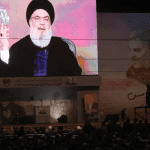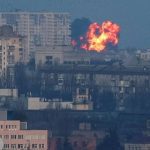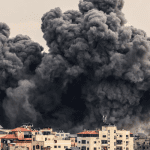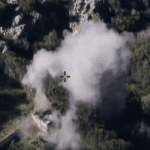Hezbollah’s new chief, Naim Qassem, in his first remarks since being elected on Oct. 29, said on Wednesday, that the armed Lebanese group would continue on its path of war with Israel.
Mr. Qassem asserted that he planned to follow the agenda set by his predecessor, Hassan Nasrallah, who was killed in an Israeli airstrike on the Lebanese capital in September.
According to him “We will continue our war plan within the outlined political frameworks, we will remain on the path of war.
“If the Israelis decide to stop the aggression, we say that we accept, but according to the conditions that we see as suitable,” Qassem stressed.
“We will not beg for a cease fire as we will continue fighting, no matter how long it takes.”
The speech came as international mediators have launched a new push for negotiated cease-fires in Lebanon and Gaza.
Mr. Qassem stated that the group had been “hurt” by a series of blows dealt to it in recent weeks, including pager and walkie-talkie explosions targeting Hezbollah members in mid-September and Nasrallah’s assassination, but that the group was able to reorganize its ranks within eight days of his death.

He cited the steady stream of Israeli soldiers wounded and killed in southern Lebanon since Israeli forces launched a military invasion on October 1, as well as Hezbollah’s drone attack on Israeli Prime Minister Benjamin Netanyahu’s home earlier this month. Netanyahu was unharmed.
He added Hezbollah has been working with Lebanese Parliament Speaker Nabih Berri, the principal Lebanese liaison with the US, to put out a number of recommendations to resolve the crisis.
Israel has yet to respond to the address.
The Israeli army had already issued an evacuation warning for Baalbek population, including the historic Roman temple complex, which is included as a UNESCO World Heritage site.
The order also included nearby areas and important highways in the Bekaa Valley. On October 6, an Israeli strike landed about 700 meters (750 yards) from the ancient citadel, which includes two of the world’s largest Roman temples.
Hezbollah’s new chief, Naim Qassem, in his first remarks since being elected on Oct. 29, said on Wednesday, that the armed Lebanese group would continue on its path of war with Israel.
Mr. Qassem asserted that he planned to follow the agenda set by his predecessor, Hassan Nasrallah, who was killed in an Israeli airstrike on the Lebanese capital in September.
According to him “We will continue our war plan within the outlined political frameworks, we will remain on the path of war.
“If the Israelis decide to stop the aggression, we say that we accept, but according to the conditions that we see as suitable,” Qassem stressed.
“We will not beg for a cease fire as we will continue fighting, no matter how long it takes.”
The speech came as international mediators have launched a new push for negotiated cease-fires in Lebanon and Gaza.
Mr. Qassem stated that the group had been “hurt” by a series of blows dealt to it in recent weeks, including pager and walkie-talkie explosions targeting Hezbollah members in mid-September and Nasrallah’s assassination, but that the group was able to reorganize its ranks within eight days of his death.

He cited the steady stream of Israeli soldiers wounded and killed in southern Lebanon since Israeli forces launched a military invasion on October 1, as well as Hezbollah’s drone attack on Israeli Prime Minister Benjamin Netanyahu’s home earlier this month. Netanyahu was unharmed.
He added Hezbollah has been working with Lebanese Parliament Speaker Nabih Berri, the principal Lebanese liaison with the US, to put out a number of recommendations to resolve the crisis.
Israel has yet to respond to the address.
The Israeli army had already issued an evacuation warning for Baalbek population, including the historic Roman temple complex, which is included as a UNESCO World Heritage site.
The order also included nearby areas and important highways in the Bekaa Valley. On October 6, an Israeli strike landed about 700 meters (750 yards) from the ancient citadel, which includes two of the world’s largest Roman temples.
Hezbollah’s new chief, Naim Qassem, in his first remarks since being elected on Oct. 29, said on Wednesday, that the armed Lebanese group would continue on its path of war with Israel.
Mr. Qassem asserted that he planned to follow the agenda set by his predecessor, Hassan Nasrallah, who was killed in an Israeli airstrike on the Lebanese capital in September.
According to him “We will continue our war plan within the outlined political frameworks, we will remain on the path of war.
“If the Israelis decide to stop the aggression, we say that we accept, but according to the conditions that we see as suitable,” Qassem stressed.
“We will not beg for a cease fire as we will continue fighting, no matter how long it takes.”
The speech came as international mediators have launched a new push for negotiated cease-fires in Lebanon and Gaza.
Mr. Qassem stated that the group had been “hurt” by a series of blows dealt to it in recent weeks, including pager and walkie-talkie explosions targeting Hezbollah members in mid-September and Nasrallah’s assassination, but that the group was able to reorganize its ranks within eight days of his death.

He cited the steady stream of Israeli soldiers wounded and killed in southern Lebanon since Israeli forces launched a military invasion on October 1, as well as Hezbollah’s drone attack on Israeli Prime Minister Benjamin Netanyahu’s home earlier this month. Netanyahu was unharmed.
He added Hezbollah has been working with Lebanese Parliament Speaker Nabih Berri, the principal Lebanese liaison with the US, to put out a number of recommendations to resolve the crisis.
Israel has yet to respond to the address.
The Israeli army had already issued an evacuation warning for Baalbek population, including the historic Roman temple complex, which is included as a UNESCO World Heritage site.
The order also included nearby areas and important highways in the Bekaa Valley. On October 6, an Israeli strike landed about 700 meters (750 yards) from the ancient citadel, which includes two of the world’s largest Roman temples.
Hezbollah’s new chief, Naim Qassem, in his first remarks since being elected on Oct. 29, said on Wednesday, that the armed Lebanese group would continue on its path of war with Israel.
Mr. Qassem asserted that he planned to follow the agenda set by his predecessor, Hassan Nasrallah, who was killed in an Israeli airstrike on the Lebanese capital in September.
According to him “We will continue our war plan within the outlined political frameworks, we will remain on the path of war.
“If the Israelis decide to stop the aggression, we say that we accept, but according to the conditions that we see as suitable,” Qassem stressed.
“We will not beg for a cease fire as we will continue fighting, no matter how long it takes.”
The speech came as international mediators have launched a new push for negotiated cease-fires in Lebanon and Gaza.
Mr. Qassem stated that the group had been “hurt” by a series of blows dealt to it in recent weeks, including pager and walkie-talkie explosions targeting Hezbollah members in mid-September and Nasrallah’s assassination, but that the group was able to reorganize its ranks within eight days of his death.

He cited the steady stream of Israeli soldiers wounded and killed in southern Lebanon since Israeli forces launched a military invasion on October 1, as well as Hezbollah’s drone attack on Israeli Prime Minister Benjamin Netanyahu’s home earlier this month. Netanyahu was unharmed.
He added Hezbollah has been working with Lebanese Parliament Speaker Nabih Berri, the principal Lebanese liaison with the US, to put out a number of recommendations to resolve the crisis.
Israel has yet to respond to the address.
The Israeli army had already issued an evacuation warning for Baalbek population, including the historic Roman temple complex, which is included as a UNESCO World Heritage site.
The order also included nearby areas and important highways in the Bekaa Valley. On October 6, an Israeli strike landed about 700 meters (750 yards) from the ancient citadel, which includes two of the world’s largest Roman temples.
Hezbollah’s new chief, Naim Qassem, in his first remarks since being elected on Oct. 29, said on Wednesday, that the armed Lebanese group would continue on its path of war with Israel.
Mr. Qassem asserted that he planned to follow the agenda set by his predecessor, Hassan Nasrallah, who was killed in an Israeli airstrike on the Lebanese capital in September.
According to him “We will continue our war plan within the outlined political frameworks, we will remain on the path of war.
“If the Israelis decide to stop the aggression, we say that we accept, but according to the conditions that we see as suitable,” Qassem stressed.
“We will not beg for a cease fire as we will continue fighting, no matter how long it takes.”
The speech came as international mediators have launched a new push for negotiated cease-fires in Lebanon and Gaza.
Mr. Qassem stated that the group had been “hurt” by a series of blows dealt to it in recent weeks, including pager and walkie-talkie explosions targeting Hezbollah members in mid-September and Nasrallah’s assassination, but that the group was able to reorganize its ranks within eight days of his death.

He cited the steady stream of Israeli soldiers wounded and killed in southern Lebanon since Israeli forces launched a military invasion on October 1, as well as Hezbollah’s drone attack on Israeli Prime Minister Benjamin Netanyahu’s home earlier this month. Netanyahu was unharmed.
He added Hezbollah has been working with Lebanese Parliament Speaker Nabih Berri, the principal Lebanese liaison with the US, to put out a number of recommendations to resolve the crisis.
Israel has yet to respond to the address.
The Israeli army had already issued an evacuation warning for Baalbek population, including the historic Roman temple complex, which is included as a UNESCO World Heritage site.
The order also included nearby areas and important highways in the Bekaa Valley. On October 6, an Israeli strike landed about 700 meters (750 yards) from the ancient citadel, which includes two of the world’s largest Roman temples.
Hezbollah’s new chief, Naim Qassem, in his first remarks since being elected on Oct. 29, said on Wednesday, that the armed Lebanese group would continue on its path of war with Israel.
Mr. Qassem asserted that he planned to follow the agenda set by his predecessor, Hassan Nasrallah, who was killed in an Israeli airstrike on the Lebanese capital in September.
According to him “We will continue our war plan within the outlined political frameworks, we will remain on the path of war.
“If the Israelis decide to stop the aggression, we say that we accept, but according to the conditions that we see as suitable,” Qassem stressed.
“We will not beg for a cease fire as we will continue fighting, no matter how long it takes.”
The speech came as international mediators have launched a new push for negotiated cease-fires in Lebanon and Gaza.
Mr. Qassem stated that the group had been “hurt” by a series of blows dealt to it in recent weeks, including pager and walkie-talkie explosions targeting Hezbollah members in mid-September and Nasrallah’s assassination, but that the group was able to reorganize its ranks within eight days of his death.

He cited the steady stream of Israeli soldiers wounded and killed in southern Lebanon since Israeli forces launched a military invasion on October 1, as well as Hezbollah’s drone attack on Israeli Prime Minister Benjamin Netanyahu’s home earlier this month. Netanyahu was unharmed.
He added Hezbollah has been working with Lebanese Parliament Speaker Nabih Berri, the principal Lebanese liaison with the US, to put out a number of recommendations to resolve the crisis.
Israel has yet to respond to the address.
The Israeli army had already issued an evacuation warning for Baalbek population, including the historic Roman temple complex, which is included as a UNESCO World Heritage site.
The order also included nearby areas and important highways in the Bekaa Valley. On October 6, an Israeli strike landed about 700 meters (750 yards) from the ancient citadel, which includes two of the world’s largest Roman temples.
Hezbollah’s new chief, Naim Qassem, in his first remarks since being elected on Oct. 29, said on Wednesday, that the armed Lebanese group would continue on its path of war with Israel.
Mr. Qassem asserted that he planned to follow the agenda set by his predecessor, Hassan Nasrallah, who was killed in an Israeli airstrike on the Lebanese capital in September.
According to him “We will continue our war plan within the outlined political frameworks, we will remain on the path of war.
“If the Israelis decide to stop the aggression, we say that we accept, but according to the conditions that we see as suitable,” Qassem stressed.
“We will not beg for a cease fire as we will continue fighting, no matter how long it takes.”
The speech came as international mediators have launched a new push for negotiated cease-fires in Lebanon and Gaza.
Mr. Qassem stated that the group had been “hurt” by a series of blows dealt to it in recent weeks, including pager and walkie-talkie explosions targeting Hezbollah members in mid-September and Nasrallah’s assassination, but that the group was able to reorganize its ranks within eight days of his death.

He cited the steady stream of Israeli soldiers wounded and killed in southern Lebanon since Israeli forces launched a military invasion on October 1, as well as Hezbollah’s drone attack on Israeli Prime Minister Benjamin Netanyahu’s home earlier this month. Netanyahu was unharmed.
He added Hezbollah has been working with Lebanese Parliament Speaker Nabih Berri, the principal Lebanese liaison with the US, to put out a number of recommendations to resolve the crisis.
Israel has yet to respond to the address.
The Israeli army had already issued an evacuation warning for Baalbek population, including the historic Roman temple complex, which is included as a UNESCO World Heritage site.
The order also included nearby areas and important highways in the Bekaa Valley. On October 6, an Israeli strike landed about 700 meters (750 yards) from the ancient citadel, which includes two of the world’s largest Roman temples.
Hezbollah’s new chief, Naim Qassem, in his first remarks since being elected on Oct. 29, said on Wednesday, that the armed Lebanese group would continue on its path of war with Israel.
Mr. Qassem asserted that he planned to follow the agenda set by his predecessor, Hassan Nasrallah, who was killed in an Israeli airstrike on the Lebanese capital in September.
According to him “We will continue our war plan within the outlined political frameworks, we will remain on the path of war.
“If the Israelis decide to stop the aggression, we say that we accept, but according to the conditions that we see as suitable,” Qassem stressed.
“We will not beg for a cease fire as we will continue fighting, no matter how long it takes.”
The speech came as international mediators have launched a new push for negotiated cease-fires in Lebanon and Gaza.
Mr. Qassem stated that the group had been “hurt” by a series of blows dealt to it in recent weeks, including pager and walkie-talkie explosions targeting Hezbollah members in mid-September and Nasrallah’s assassination, but that the group was able to reorganize its ranks within eight days of his death.

He cited the steady stream of Israeli soldiers wounded and killed in southern Lebanon since Israeli forces launched a military invasion on October 1, as well as Hezbollah’s drone attack on Israeli Prime Minister Benjamin Netanyahu’s home earlier this month. Netanyahu was unharmed.
He added Hezbollah has been working with Lebanese Parliament Speaker Nabih Berri, the principal Lebanese liaison with the US, to put out a number of recommendations to resolve the crisis.
Israel has yet to respond to the address.
The Israeli army had already issued an evacuation warning for Baalbek population, including the historic Roman temple complex, which is included as a UNESCO World Heritage site.
The order also included nearby areas and important highways in the Bekaa Valley. On October 6, an Israeli strike landed about 700 meters (750 yards) from the ancient citadel, which includes two of the world’s largest Roman temples.













